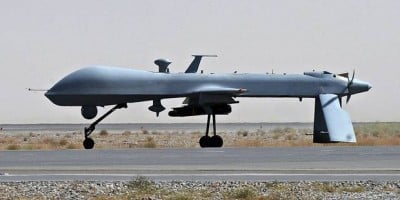War Zone Tactics Come Home as Pentagon Admits Domestic Spy Drone Use

An internal Pentagon report made public on Wednesday revealed that the U.S. Department of Defense has been using unarmed drones to conduct surveillance missions over American soil since 2006.
The Pentagon inspector general report, entitled “Evaluation of DoD Use of Unmanned Aircraft Systems (UAS) for Support to Civil Authorities,” obtained by USA Today through a Freedom of Information Act request, said that “less than 20” such missions occurred between 2006 and 2015, though they anticipate many more in the years to come.
“More than ten years of war in the combat zones of Iraq and Afghanistan have taught a generation of Airmen valuable lessons about the use of Remotely Piloted Airdfta (RPA) and other [Intelligence, Surveillance, and Reconnaissance (ISR)] assets,” the analysis states.
“As the nation winds down these wars,” it continues,
“and USAF RPA and ISR assets become available to support other combatant command (COCOM) or U.S. agencies, the appetite to use them in the domestic environment to collect airborne imagery continues to grow, as does Congressional and media interest in their employment.”
Moreover, “multiple” military units that operate drones expressed interest in having more opportunities to fly them on domestic missions as “opportunities for UAS realistic training and use have decreased.”
The review concludes that all missions were conducted within “full compliance” of the law.

An MQ-9 Reaper drone, also known as a Predator B, is flown by the Department of Homeland Security. (Photo: U.S. Customs and Border Protection, via Wikimedia Commons)
The trouble is, as even the Pentagon analysis notes, at the time there were no standardized, federal statues that “specifically address the employment of the capability provided by a DoD UAS if requested by domestic civil authorities.”
Jay Stanley, a senior policy analyst for the American Civil Liberties Union (ACLU), told USA Today that domestic laws often lag behind technological capabilities. “Sometimes, new technology changes so rapidly that existing law no longer fit what people think are appropriate,” Stanley said. “It’s important to remember that the American people do find this to be a very, very sensitive topic.”
USA Today reports that
“Shortly before the inspector general report was completed a year ago, the Pentagon issued a new policy governing the use of spy drones. It requires the defense secretary to approve all domestic spy drone operations. It says that unless permitted by law and approved by the secretary, drones ‘may not conduct surveillance on U.S. persons.’ It also bans the use of armed drones over the United States for anything other than training and testing.”
National Security Agency whistleblower Thomas Drake questioned on Twitter whether these revelations mean that there is “new meaning to ‘rare & lawful’ Posse Comitatus?” referring to a U.S. federal law that limits the powers of the federal government in using military personnel to enforce domestic policies in the U.S..

